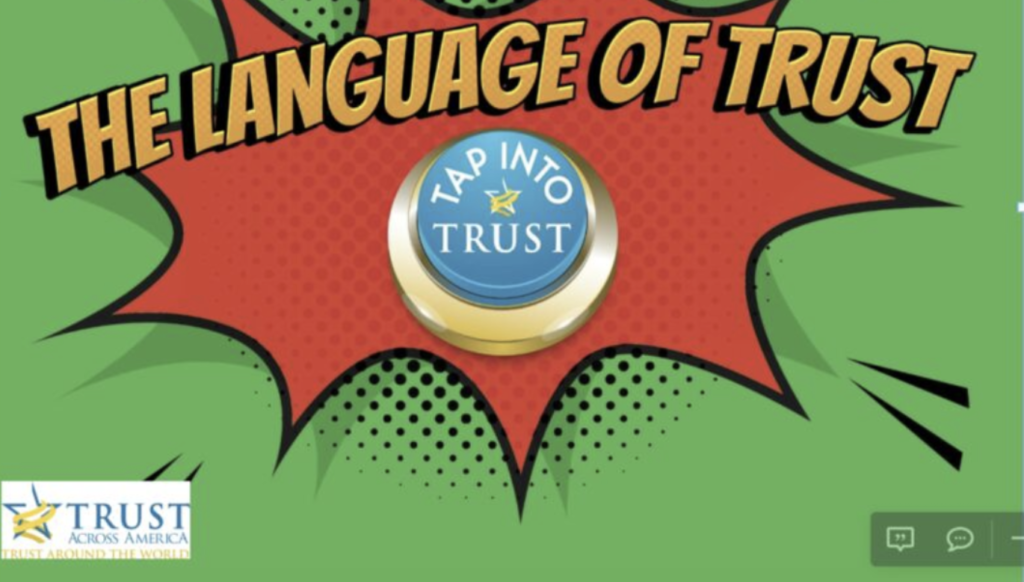
When I was recently asked how trust has changed in the past decade my response was “Not much.” While the people, groups and institutions we should trust keep rearranging themselves in our collective minds, some gain in trust while others fade. Yet according to most major public opinion poll headlines trust has been declining.
But if you think about it, how we experience trust now is the same as it ever was. So is the value of trust – what it does for us – in business, politics, society, and life. Trust is very simply, the outcome of principled behavior. It always has been and always will be. As Stephen Covey has written, “Trust is the foundation for everything we do….” It is part of every relationship we have and undergirds everything we want or need to do together. So it is not that trust has been declining, it is trusting that has declined, and distrusting that has increased.
The Unchanging Experience of Trust
Our bodily experience of trust (and distrust), the sensations we feel, and the underlying neurophysiology that produce them have been with us for millennia. We are hard-wired to trust and to distrust, and we need both. Trusting others allows us to work together to accomplish what none of us can do alone. Distrust is built into our biology to help us stay alive and safe. What we are predisposed to do when we trust or distrust someone, or a group of someones, is also pretty much the same now as when humans were living in small clans and painting on cave walls.
Humans are wired to be drawn towards trust. When we trust others we feel safe enough to be open and at ease with them. At work this translates to collaborating effectively and having fun doing it. We happily share our ideas, good, bad and everything between, with people we trust. When we trust an information source we form opinions and act based on what we hear from them. When we trust a company, we tend to buy from them and invest in them. Distrust, on the other hand, insists we act to protect ourselves. Like a plague, we avoid people, groups, companies, and institutions we don’t trust.
In Whom We Trust (or not)
When you think “I trust this person/group/company/organization” an assessment is being made that their future behavior won’t harm and in fact will support you. That assessment leads to the embodied experience of trust described above, together with feeling certain emotions that travel with trusting, e.g., generosity, curiosity, hope, happiness, care. The same is so with the assessment “I don’t trust” except the sensations and emotions are distinctly different.
Which brings me to what has changed in the past decade and continues to change: specifically who we are trusting, and to what extent we are trusting them to do what they say they will do. According to several recent polls on perception of trust, we are trusting less. For example, over the past decade the Edelman Trust Barometer, an annual global opinion poll of trust levels in business, government, NGOs, and media, has found an annual shift in which of these institutions we are trusting more or less. Similarly public opinion surveys conducted by PwC, Pew Research Center and the Knight Foundation have looked at the trust employees and customers have in companies vs. what company leaders believe, and our trust in science and media, respectively. Again, they find changes in who we are trusting/distrusting.
Couple rotating/decreasing trust in societal institutions with what we know about the outcome of distrusting others and we have the makings of a slow-moving disaster. Unless we start turning this ship around we will see diminishing cooperation with increasing polarization, more balkanization in politics, media and society, and less willingness to talk things out as people pull back from those they distrust.
Trust-Building as Necessary Work
I believe now more than ever it’s time for those of us who work in the field of trust-building, who have the tools and expertise, to focus on helping the people we work with become trust-builders in their chosen fields. We understand that this is a competency that can be learned, developed and practiced. We have frameworks and tools to support people as they try to build their own trust-building capability and capacity. It is incumbent on leaders everywhere to step up and put learning and practicing trust-building at the forefront of their work.
Trusting people at work (where we spend most of our time) and in our communities, and between us and the institutions that hold together the fabric of those communities, is going to be essential for us as a species to make it through the big storms looming on the near horizon: political and social upheaval, and the potential threats posed by AI, to name just a few.
Barbara Brooks Kimmel is an author, speaker, product developer and global subject matter expert on trust and trustworthiness. Founder of Trust Across America-Trust Around the World she is author of the award-winning Trust Inc., Strategies for Building Your Company’s Most Valuable Asset, Trust Inc., 52 Weeks of Activities and Inspirations for Building Workplace Trust and Trust Inc., a Guide for Boards & C-Suites. She majored in International Affairs (Lafayette College), and has an MBA (Baruch- City University of NY). Her expertise on trust has been cited in Harvard Business Review, Investor’s Business Daily, Thomson Reuters, BBC Radio, The Conference Board, Financial Times, Global Finance Magazine, Bank Director and Forbes, among others.

Recent Comments